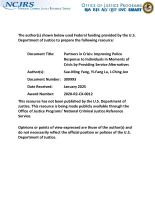Mental health
Race, Health, and Recidivism: Examining the Effects of Health Status and Healthcare Needs on Recidivism for Black and White Formerly Incarcerated People
Elevated Odds of Dating Violence Among US Youth with Mental Health and Neurodevelopmental Conditions: Estimates from a Nationally Representative Cross-Sectional Study
Understanding and Reducing Deaths in Custody: Analysis of the Bureau of Justice Assistance Death in Custody Reporting Act (DCRA) Data
Adverse Childhood Experiences and Current Health Status in a Community Sample of Runaway and Homeless Youth
Forever Free Substance Abuse Program at the California Institute for Women in Frontera, California
How Are Adult Felony Sex Offenders Managed on Probation and Parole? A National Survey, Final Report
Mental Disorder and Violent Crime: A 20-Year Cohort Study; Final Report
Evaluation of Mental Health Expert Assistance Provided to Indigent Criminal Defendants: Organization, Administration and Fiscal Management, Executive Summary
Disturbed Violent Offender, Final Report
Disturbed Violent Offender, Final Report
Psychological Impact of Crime: A Study of Randomly Surveyed Crime Victims, Executive Summary
Exposure to Child Sexual Abuse Materials Among Law Enforcement Investigative Personnel: Exploring Trauma and Resilience Profiles
Local Correctional Programming - Minnesota Community Corrections Act Evaluation
Breaking the Cycle of Intergenerational Childhood Maltreatment: Effects on Offspring Mental Health
Essays on Mental Health, Education, and Parental Labor Force Participation
Exploring Pathways to Desistance and Adjustment in Adulthood Among Juvenile Justice Involved Females
Partners in Crisis: Improving Police Response to Individuals in Moments of Crisis by Providing Service Alternatives
Behind the Evidence: Supporting Mental Health and Morale
Mental Health and Wellness: Challenges Faced by Pathologists
This training was presented as a part of the National Center on Forensics conference at George Mason University on August 8th, 2023. In this session, Board Certified Pathologist and Medical Director Marissa Saint Martin discusses the challenges that pathologists often face in regard to mental health, specifically burnout.
See the YouTube Terms of Service and Google Privacy Policy





